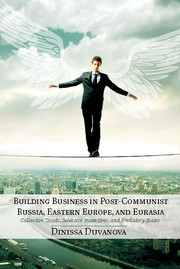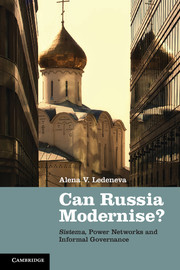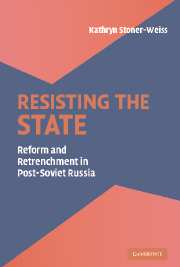Building Business in Post-Communist Russia, Eastern Europe, and Eurasia
Prior to 1989, the communist countries of Eastern Europe and the USSR lacked genuine employer and industry associations. After the collapse of communism, industry associations mushroomed throughout the region. Duvanova argues that abusive regulatory regimes discourage the formation of business associations and poor regulatory enforcement tends to encourage associational membership growth. Academic research often treats special interest groups as vehicles of protectionism and non-productive collusion. This book challenges this perspective with evidence of market-friendly activities by industry associations and their benign influence on patterns of public governance. Careful analysis of cross-national quantitative data spanning more than 25 countries, and qualitative examination of business associations in Russia, Ukraine, Kazakhstan and Croatia, shows that postcommunist business associations function as substitutes for state and private mechanisms of economic governance. These arguments and empirical findings put the long-standing issues of economic regulations, public goods and collective action in a new theoretical perspective.
- Addresses a largely overlooked but highly consequential area of postcommunist political economy: formally organized special interest groups representing different economic sectors; one of the first works that addresses this topic from a cross-national and cross-industry perspective
- Offers a new perspective on special interest organization: documents the benign effects of business organizations in structuring the markets, promoting regulatory reforms and countervailing bureaucratic corruption
- Champions the multi-method research strategy: theoretical arguments are tested against multiple types of data, and the qualitative and quantitative comparative analyses are mutually informing
Reviews & endorsements
“Much of the literature takes the existence of business associations as a given. Dinissa Duvanova helps us understand how such organizations could have emerged in the harsh environment of post-Communism. Her novel and persuasive thesis – that business associations exist to provide the selective benefit of protection against the state – should be taken seriously by anyone with an interest in the origins of civil society.” – Scott Gehlbach, University of Wisconsin–Madison
“In providing the most comprehensive treatment of business associations in the post-Communist space, Dinissa Duvanova pushes back hard against facile portraits of organized business as exclusively protectionist and rent-seeking, presenting a compelling case that much of what these associations do and seek is complementary to the development of better-functioning, more competitive markets.” – William Pyle, Middlebury College
“Dinissa Duvanova’s book makes a valuable addition to our understanding of state-business relations in the post-Communist world. Examining the reasons firms form and join business associations, she finds that they help protect firms against weak, corrupt, and intrusive regulatory environments. She tests her thesis with survey data and case studies of associations in four countries. She makes a compelling case that business associations play an important role in building market economies.” – Thomas F. Remington, Emory University
Product details
February 2013Hardback
9781107030169
267 pages
235 × 155 × 19 mm
0.5kg
16 b/w illus.
Available
Table of Contents
- 1. Introduction
- 2. Collective action in adverse business environments
- 3. Postcommunist business representation in a comparative perspective
- 4. Business environment and business organization: the quantitative approach
- 5. What you do is what you are: business associations in action
- 6. Compulsory vs voluntary membership
- 7. Conclusions.





